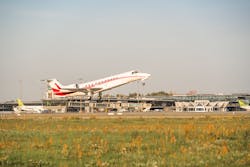Riga Airport Gets Involved in Ambitious Hydrogen Testing Project
The Latvian Hydrogen Association and Riga Airport are joining partners to promote the application of the hydrogen solution in the Latvian aviation industry by supporting the initiative of Hamburg Airport.
Within the framework of the Interreg Baltic Sea Programme funding category “Green Mobility", the project "BSR Hydrogen Air Transport – Preparation of Baltic Sea Region Airports for Green Hydrogen" initiated by Hamburg Airport was approved in June, which aims to better connect rural regions of the Baltic Sea with existing aviation hubs, also using hydrogen-powered small aircraft.
Riga Airport, Latvian University of Biosciences and Technologies and aviation fuel supplier SIA "Gulfsteram Oil" will participate in the development of the project at the invitation of the Latvian Hydrogen Association. A total of 16 partners are involved in the project, as well as 24 associated organizations, including the national airline airBaltic, Liepāja Airport and more. The project will start this November and will last for about three years. Almost all major airport operators located around the Baltic Sea, such as Finavia, Swedavia, Tallinn and Lithuanian airports are represented in the initiative. The project budget is approximately 4.8 million euros, of which approximately 1.1 million euros will be allocated to Hamburg Airport, while the other project partners will receive EU funding in the amount of approximately 80 percent.
The project aims, among other things, to revitalize regional air traffic, and the partnership also involves several smaller airports and regional airlines. An important part of the project is the development of a green, gaseous hydrogen supply chain from production to the refueling of aircraft or airport ground equipment, as well as other pilot operations. The aim of the project is to develop the prerequisites for an airport infrastructure adapted to hydrogen-powered aircraft. At its conclusion, all airports must be ready to invest and implement their own infrastructure projects, as well as a real demonstration flight with a hydrogen plane from Hamburg Airport.
Aivars Starikovs, board member of the Latvian Hydrogen Association, says that this is a great opportunity for Latvia to participate in a pilot project together with the large European airports, which have access to much more funding for conducting various experiments, and to obtain detailed data analysis. "Hydrogen as an energy carrier can be both an aviation fuel and serve as an energy supply solution for the airport's service infrastructure, which is often neglected. However, the service infrastructure, such as the energy supply for air traffic controllers and terminals, the provision of backup current power, runway lighting and cleaners, territory survey drones, etc., play an even more important role in achieving the goals of climate neutrality than the use of aviation fuel in air transportation," concludes the expert.
"Riga Airport has set ambitious goals in the field of sustainability to become a climate-neutral airport. Participating in various types of innovation projects is one of the ways to achieve these goals by promoting innovation and the development of new technologies, which will also be used in our airport in the future and will promote the competitiveness of Riga Airport," says airport board member Normunds Feierbergs.
